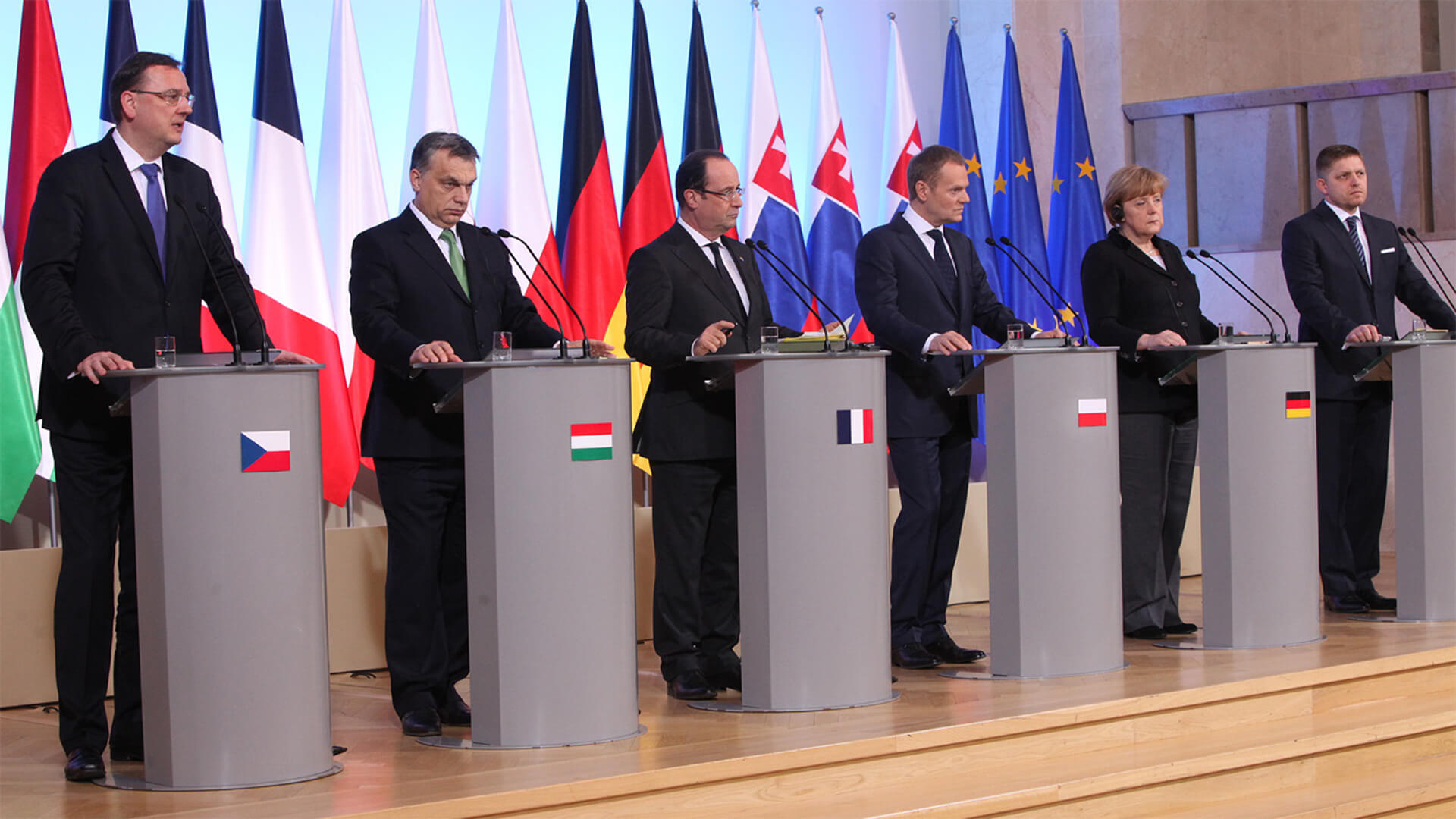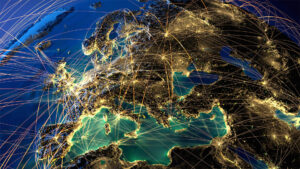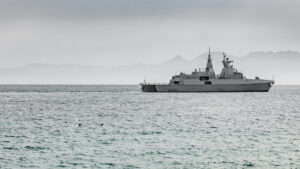In the post-Cold War world, France, Germany and Poland concocted the Weimar Triangle as a way to foster cooperation amongst the three countries. The trio has weakened over the years – due to differing national priorities – but Russia’s invasion of Ukraine might necessitate getting the gang back together.
Thanks to their renewed military collaboration, the Weimar Triangle will be working to develop long-range weapons to enhance their defensive capabilities; the aim is to prevent Russia from falling back into its old ways. While these three countries have a good thing going, Henry Kissinger argued that a Weimar Quartet might be even better – if not necessary.
Ukraine would strengthen the triangles’ ability to ensure regional stability and effectively counter Russian threats. The bottom line is that when (or if since we’re feeling optimistic) the Russians come knocking, these countries sure as hell want all the tools and partners necessary to stop them in their tracks…
Here at Zeihan On Geopolitics we select a single charity to sponsor. We have two criteria:
First, we look across the world and use our skill sets to identify where the needs are most acute. Second, we look for an institution with preexisting networks for both materials gathering and aid distribution. That way we know every cent of our donation is not simply going directly to where help is needed most, but our donations serve as a force multiplier for a system already in existence. Then we give what we can.
Today, our chosen charity is a group called Medshare, which provides emergency medical services to communities in need, with a very heavy emphasis on locations facing acute crises. Medshare operates right in the thick of it. Until future notice, every cent we earn from every book we sell in every format through every retailer is going to Medshare’s Ukraine fund.
And then there’s you.
Our newsletters and videologues are not only free, they will always be free. We also will never share your contact information with anyone. All we ask is that if you find one of our releases in any way useful, that you make a donation to Medshare. Over one third of Ukraine’s pre-war population has either been forced from their homes, kidnapped and shipped to Russia, or is trying to survive in occupied lands. This is our way to help who we can. Please, join us.
Transcript
Hey everybody, Peter Zeihan here. Coming to you from the base of the serious part of West Spanish Peak in New Mexico, adjacent to southern Colorado. I’m waiting for a storm to pass before I get out on the ridge line. Being 6.5 feet tall and a Thunder Boomer isn’t really the best call. Anyway, on the topic of things that have been mehhhh, but very soon may be incredible.
Today, 27th of June, there was a summit with a group called the Weimar Triangle, which includes the leadership of France, Poland, and Germany, the three critical countries of the Northern European Plain. The Weimar Triangle was envisioned in the aftermath of the Cold War when Poland was no longer a Soviet satellite country and was on the way to joining the European Union and NATO organizations that Poland has since joined. The idea was that in the long swath of bloody European history, France, Germany, and Poland tended to find themselves on different sides of most major issues, leading to many of the major wars.
Anyway, the idea was that if you get them all on the same side, then the Northern European Plain, instead of being the most blood-soaked part of the planet, can become something better—a path of trade and cooperation.
And you could argue that the idea of the Weimar Triangle has been realized, but it’s not because of the triangle. This is how it all started in the 1990s, but by the time we got to the 2010s, the three countries drifted apart. France tried to be an independent pole in international affairs, which is always a mixed bag. Germany tried to forego the politics and security talks and simply focused on trade by exploiting labor and infrastructure in Central Europe, taking a completely amoral position on everything that mattered. And Poland was in and out, in and out, with every possible interpretation of what it means to be Polish. Remember that Poland had its first democratic elections in the early 1990s.
So here we are, really only one generation later. There are a lot of deep divisions within Polish society about the role of government and where Poland fits within Europe and the wider world, and it’s not going to reach equilibrium anytime soon. By the time we got to about 2002, especially with the Iraq war in 2003, the Weimar Triangle had basically fallen apart until Russia invaded Ukraine in 2022.
Now, the three states are starting to talk a lot. Instead of collaborating on economic issues, they have decided to start working on joint military acquisitions and development, specifically for long-range cruise missiles with a range in excess of 2000 km. The reason is simple: as the Germans will tell you, if you go to war with the Russians and take a defensive position, the entire wealth and resources of the Russian Federation, Soviet Union, or Tsarist Imperial Russia, whatever it happens to be, can be collected into a single fist and punch at you wherever it wants. If you are left playing defense against that, you are going to lose. You have to have a deep strike capacity that shatters the infrastructure and logistical capability of the Russians far from the front. Throughout the Cold War, this is basically what NATO did by practicing things like the North Cape exercises, which weren’t necessarily designed to plug the Fulda Gap but instead to prevent the Russians from reaching the gap in the first place.
Now, where to go with this? It’s a realization, especially in Germany, where the defense minister is heading up this effort, that we are in a fundamentally different world. The foreign policies of the French and the Germans in recent years simply don’t work anymore. Getting that sort of weapons capacity in Europe gives the Europeans the ability to forestall a Russian invasion if Ukraine falls. The Poles know they’re next, and the Germans are fearful they’re after the Poles. So it makes sense to do this as soon as possible.
The question, of course, is whether it’s going to work as well as my hike. The answer is probably not, because even if the triangle can come up with the perfect weapon system, launching from the eastern half of Poland, you’re still a long way from huge parts of the Russian industrial base. Remember, during World War II, with the German invasion of the Soviet Union, Stalin built a lot of industrial plants on the other side of the Urals. We’re talking about a big place here, which is why that greenie peacenik Henry Kissinger always said in the post-Cold War era that no matter what your goal is vis-à-vis Moscow, it can’t be achieved by the Weimar Triangle alone—it has to be a Weimar Quartet. Ukraine has to be involved. If Russia is hostile, then you get a civil war among the Slavs, and you can launch an assault from 1500 miles further east, throwing a huge amount of Russian territory open.
Remember, from the Ukrainian border to Moscow is only about 350 miles. That’s not that far. More importantly, Ukraine is not technically part of the Northern European Plain; it’s actually in the Eurasian heartlands itself. So you split that territory between Russia and Ukraine, and instead of Russia being able to focus all of its attention on the Polish Gap, it suddenly has this massive frontier to worry about.
That’s in part why Putin launched the war in the first place. But second, the better option, as Kissinger put forward, is to assume that Russia gives up its genocidal irredentist ways and decides to join the family of nations. Splitting the territory ensures that you can never have a retrenchment that would be sustainable. If there is a way forward where Moscow is a decent place and Russia becomes a normal country, it will do so with Ukraine on its side. The only way to ensure that works is to have the Weimar Quartet fortify Ukraine, not just economically but also militarily, so there can’t be any backsliding.
Of course, the question then is: will that work? Well, that’s why we call it making history. All right, see you on the next mountain.
Photo in header by Občanská demokratická strana | Civic Democratic Party in the Czech Republic | Wikimedia Commons








